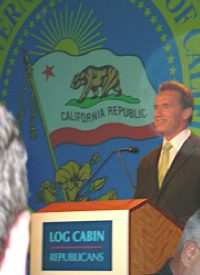
As the nation faces a crucial election in a little over six months, the Republican Party appears to be caving in on a social issue that many conservatives consider of major import: same-sex marriage. What the GOP felt strongly enough about some 16 years ago to lead the fight for passage of the federal Defense of Marriage Act (DOMA), many members are beginning to consider an issue open to compromise. Not only do many Republican House and Senate members consider “gay” marriage a “dead issue,” according to Politico.com, but Republican leadership has “evolved” to the point that it has quietly worked “behind the scenes to kill amendments that reaffirm opposition to same-sex unions,” the politics website reported.
The change, of course, has nothing to do with personal convictions, but much to do with political expediency, as party functionaries fine-tune their agenda to attract a demographic that has been conditioned to tolerate — and even embrace — homosexuality as normal. While the GOP certainly cannot match the Democrats in their fawning attitudes toward the “gay” lobby, there has nonetheless “been an evolution in the political approach — and an acknowledgment of a cultural shift in the country,” Politico’s Jake Sherman and Anna Palmer write. “Same-sex relationships are more prominent and accepted. There are more gay public figures — including politicians — and it’s likely that many Washington Republicans have gay friends and coworkers. Just as important — there’s also a libertarian streak of acceptance on people’s sexuality coursing through the House Republican Conference.”
All of that adds up to an increasing number of “conservative” politicians jettisoning concern over the nation’s moral slide — of which tolerance for homosexuality is a symptom — in favor of a more pragmatic approach to their political positions. Representative Allen West (R-Fla.) demonstrated this “evolving” GOP mindset when he said, as quoted by Politico: “I personally have deep convictions about my children having a financially stable country that they can live in. I want my daughters to have the opportunities that I had, and that’s what concerns me. That’s what keeps me up awake at night, not worrying about who’s sleeping with who.”
Even lawmakers who are committed to protecting traditional marriage concede that the fight for family values is much more challenging than it used to be. Representative Dan Burton (R-Ind.), who sponsored the Marriage Protection Act of 2011, said that while he thinks defending traditional marriage is tied to the stability of the nation as a whole, the attention of many voters is presently fixated on the economy and getting America moving in a positive direction economically. “I don’t know that people’s opinions have changed that much,” he told Politico, “but what I think has happened is that people realize the dire straits this country has been in and they think we better deal with that before we get back to the social issues.”
Representative Jack Kingston (R-Ga.) noted that things have changed drastically since 1994, when President Bill Clinton introduced the “Don’t Ask, Don’t Tell” compromise for homosexuals serving in the military. “It’s been realized that back in ’94, you could jump up on the House floor and pound your chest about [gay issues], and secure a good voter intensity, which you can’t do anymore,” Kingston told Politico.
It is clear that GOP strategists are beginning to switch their focus to a younger voter demographic. According to recent polls, 31 percent of self-identified Republicans now say they support same-sex marriage. But among 18-34-year-olds overall, that number jumps to nearly 70 percent.
One candidate who may be the beneficiary of such a sea change is GOP presidential frontrunner Mitt Romney. While happy to capitalize on his moral Mormon roots, in reality the former Massachusetts Governor has always been about compromise, and the issue of homosexuality offers a prime example.
As reported by CNSNews.com, when Romney first ran for political office in 1994, challenging Ted Kennedy for his U.S. Senate seat, he set his sights on one of Kennedy’s most faithful constituencies, Massachusetts’ “gay” community. When a reporter for Boston’s Bay Windows homosexual newspaper asked the Republican candidate why “gays” should support him when Ted had always been a dependable pro-homosexual politician, Romney complimented the Democratic stalwart on that record, but suggested that he would do better, and that homosexuals could use a good lobbyist in the Republican Party.
“There’s something to be said for having a Republican who supports civil rights in this broader context, including sexual orientation,” Romney told the homosexual newspaper. “When Ted Kennedy speaks on gay rights, he’s seen as an extremist. When Mitt Romney speaks on gay rights, he’s seen as a centrist and a moderate. It’s a little like if Eugene McCarthy was arguing in favor of recognizing China, people would have called him a nut. But when Richard Nixon does it, it becomes reasonable. When Ted says it, it’s extreme; when I say it, it’s mainstream.”
Romney added, “I think the gay community needs more support from the Republican party and I would be a voice in the Republican party to foster anti-discrimination efforts.”
Such a voice out of Romney’s “mainstream” past makes him sound like just the man for the Republican Party’s new, updated image. It should also prompt true conservatives to pray fervently against his election in November.
Photo: Former California Governor Arnold Schwarzenegger addresses Log Cabin Republicans, a pro-homosexual organization.



